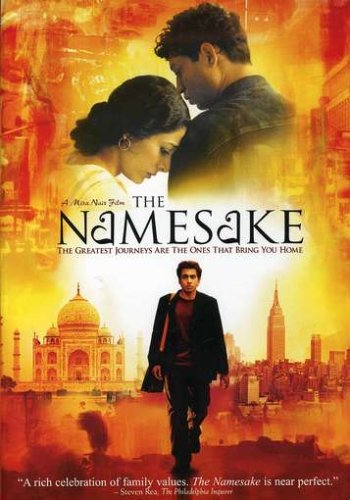
Mira Nair’s ‘The Namesake’
has a national identity crisis
“The Namesake” has its heart in the right place. Is that enough to make up for a story that is very unsure of itself?
The best thing the film does is illustrate the generation gap. That goal would seem to be secondary to its emphasis on the cultural divide between Calcutta and New York. Surprisingly, we notice less and less distinction between two countries, and more and more difference between two generations.
“The Namesake” clearly is biting off more than it should be chewing, especially for a two-hour film. Its 30-year span affords only token anecdotes about important events in the characters’ lives and invites guessing as to who this film is about. The title suggests it is about the young man, Gogol, but sentiment suggests it is about his mother, Ashima — a woman who somewhat tragically never feels quite 100 percent American nor 100 percent Indian, and in the end develops an all-too-neat compromise that, disappointingly, doesn’t seem like it can work — six months here, six months there.
The film digs itself a hole in the opening scenes, when we are told the importance of the writing of Russian author Nikolai Gogol. First, while Gogol is celebrated among academics, this is a little-known writer to Western audiences, who are not familiar with his material. Second, showing the power of any book or author on film is difficult, particularly when the film is about a book and not based on a book. (The movie is based on a book, but not a Gogol book.)
All that a non-Gogol reader comes away with is: His works are impressive, people who read it are thoughtful and scholarly, and the key characters in the film are going to be multicultural, or open to the concept.
The film, directed by Mira Nair (screenplay by Sooni Taraporevala from novel by Jhumpa Lahiri), makes us wonder what about this family is unique or special. The father, Ashoke, is apparently a highly educated engineer who is able to find work teaching in New York. We never see him once at his job, though he does note that rickshaw drivers in India tend to dress better than American professors do. Ashima for a long while will not work outside the home. They can afford a pleasant house in the suburbs and the kids, born in America, don’t seem to have trouble “fitting in.”
The person who has the most trouble feeling comfortable about anything is Ashima, and by the end we really don’t feel any more optimistic for her. It might be that Ashima, played by Tabu, is too much of a real India cinema character for Westerners to fully appreciate.
She is introduced in a way seemingly so common in India movies — an arranged marriage. It is not clear whether her family or her future husband’s carries more clout, but there is clearly a strong interest on the part of both that this marriage might happen. (Later, her husband asks why she chose him, an indication she held the cards.)
As in every film with such a scene, there is the potential to illustrate a grievous offense to women. That isn’t the goal here. Ashima is not exuberant, but does not seem disappointed in her/the choice. So what is conveyed is that this is an India cultural difference from America, but not an offensive one.
She seems mildly impressed that her husband lives in New York but is not wild about living there herself. One almost feels sorry for her inability or unwillingness to explore what New York, and America, can offer. She suggests when her children are small that the couple might want to return to India. Ashoke does not see the point, saying that in America, his children are free to study what they wish and do what they want.
Curiously, Ashima has little or no interest in Nikolai Gogol’s writings. She is painted as a stark contrast to Ashoke. He is open-minded, willing to explore, to move, to wear Western clothing, to accept a new culture. She is wedded to tradition, fearing ways it might be compromised.
How does this contrast affect their children? Their oldest child, played by a comedic type in Kal Penn, is a high school stoner. In extremely brief scenes, he looks like he might get some teasing, but isn’t too worked up about it and appears to have his share of white friends. He seems bright, just uninterested in life, and many of his decisions will call into question his judgment.
One of the film’s clichés is the family’s visit to the Taj Mahal, in which Gogol — jaded like his sister for the whole trip so far — suddenly admires his heritage and decides he’s going to be an architect, and indeed follows through.
He is told about the significance of his name, but he never seems nearly the fan of Nikolai Gogol that his father is. (It is very confusing what name he is officially given.) And then at a critical point in his life, he reverts to Indian tradition in the manner of his mother and effectively jettisons a longtime girlfriend (who is named “Maxine” to somehow further alarm his mother that this is an untraditional woman) by not inviting her to an India event that’s “a family thing.” By the end, it’s a mystery as to whether he’s accomplished anything in his life but confusion.
One generational scene is very thought-provoking. When the family returns from India, they discover their mailbox has been vandalized with graffiti, the family name “GANGULI” being changed to “GANGRENE.”
Interestingly, it is the American-born children who take offense, Gogol declaring they must find these racist vandals, while their unmoved father dismissively says it’s “just some kids having fun.”
This scene is a suggestion, or perhaps reminder, that those on the front lines of racism tend to notice it and dwell on it less than those farther downstream.
The idea of parents setting up mates is abundantly tested, but one neat little generational contrast is when, in India, Gogol refuses to sit in a rickshaw with his mother and sister, declaring "the idea of one human being pulling another is feudal and exploitative, and I don’t want to be part of it.” His mother breezily dismisses his carping, waving a parasol and enjoying the ride.
“The Namesake” unfortunately comes up a zero in its depiction of New York. The family might as well live in Flagstaff. Very little of the excitement or bustle of the city is shown, and then the family moves to some suburb in a set that seems lifted straight out of “The Brady Bunch,” only difference being the home is on a cul-de-sac. As an adult, Gogol lives in expensive, IKEA-chic apartments that could just as easily be Seattle as Manhattan.
The India scenes are more authentic, but don’t resonate nearly as well as the depictions in “Slumdog Millionaire.” Calcutta homes in “The Namesake” seem ample, which might reflect the families’ elevated social levels, but while the streets are fairly crowded, there is a noticeable lack of buzz. The trip to the Taj Mahal seems like Hollywood/Bollywood interloping into what could’ve been a much more authentic India experience.
One curiosity of “The Namesake” is that two key deaths occur offscreen. This must be explained by the fact the other characters did not witness them either. By not showing them, the film increases its shaky reliance on dialogue — as with the significance of Nikolai Gogol — to illustrate a very important point.
When seen at the theater in 2007, “The Namesake” elicited polite but warm applause at the end, especially in its tribute: “For our parents, who gave us everything.” The message seems to be that open-mindedness can coexist with tradition, to the spiritual betterment of everyone.
But “The Namesake” will forever feel incomplete, a generational drama that is too abridged, too unfocused, too inconclusive. It says something about our respect for our elders that such a flawed film can deliver a warm two-hour experience.
3 stars
(March 2009)
“The Namesake” (2007)
Starring Tabu as Ashima ♦ Kal Penn as Gogol/Nikhil ♦ Irrfan Khan as Ashoke ♦ Jacinda Barrett as Maxine ♦ Zuleikha Robinson as Moushumi Mazumdar ♦ Brooke Smith as Sally ♦ Sahira Nair as Sonia ♦ Jagannath Guha as Ghosh ♦ Ruma Guha Thakurta as Ashoke’s Mother ♦ Sandip Deb as Music Teacher ♦ Sukanya as Rini ♦ Tanushree Shankar as Ashima’s Mother ♦ Sabyasachi Chakraborty as Ashima’s Father ♦ Tamal Roy Choudhury as Ashoke’s Father ♦ Dhruv Mookerji as Rana ♦ Supriya Choudhury as Ashima’s Grandmother ♦ Stuart Rudin as Homeless Man ♦ Heather MacRae as Nurse Patty ♦ Sumitra as Calcutta House Staff ♦ Kanti as Calcutta House Staff ♦ Michael Countryman as Mr. Wilcox ♦ Kousik Bhowal as Dr. Gupta ♦ Rupak Ginn as Uncle ♦ Soham Chatterjee as Gogol (Age 4) ♦ Gargi Mukherjee as Mira Mashi ♦ Pallavi Shah as Kajol Mashi ♦ Jhumpa Lahiri as Jhumpa Mashi ♦ Noor Lahiri Vourvoulias as Baby Sonia ♦ Linus Roache as Mr. Lawson ♦ Josh Grisetti as Jerry ♦ Justin Rosini as Marc ♦ Dan McCabe as Bart ♦ Bobby Steggert as Jason ♦ B.C. Parikh as Mr. Mazumdar ♦ Sibani Biswas as Mrs. Mazumdar ♦ Lakhan Das as Baul Singer ♦ Kharaj Mukherjee as Chotu ♦ Glenne Headly as Lydia ♦ Daniel Gerrol as Gerald ♦ Amy Wright as Pam ♦ Christie Moreau as Phone Operator ♦ Jo Yang as Ms. Lu ♦ Krishna Dikshit as Funeral Priest ♦ Kartik Das as Boat Man ♦ Gary Cowling as Hotel Manager ♦ Sudipta Bhawmik as Subroto Mesho ♦ Gretchen Egolf as Astrid ♦ Baylen Thomas as Blake ♦ Jeb Brown as Oliver ♦ Jessica Blank as Edith ♦ Mia Yoo as Viola ♦ Benjamin Bauman as Donald ♦ Sebastian Roché as Pierre ♦ Maximiliano Hernández as Ben ♦ Partha Chatterjee as Reformed Hindoo ♦ Mitali Bhawmik as Singing Voice (voice) ♦ Marcus Collins as Graham ♦ Sandi DeGeorge as Moshumi’s Friend
Directed by: Mira Nair
Written by: Sooni Taraporevala
Written by: Jhumpa Lahiri (novel)
Co-producer: Lori Keith Douglas
Co-producer: Yukie Kito
co-producer: Zarina Screwvala
Executive producer: Yasushi Kotani
Executive producer: Taizo Son
Executive producer: Ronnie Screwvala
Producer: Lydia Dean Pilcher
Producer: Mira Nair
Associate producer: Dinaz Stafford
Line producer (India): Anadil Hossain
Original music: Nitin Sawhney
Cinematography: Frederick Elmes
Editing: Allyson C. Johnson
Casting: Cindy Tolan
Production design: Stephanie Carroll
Art direction: Suttirat Larlarb
Set decoration: Lydia Marks
Costume design: Arjun Bhasin
Unit production manager: Lori Keith Douglas
Production supervisor (India): Harish Amin
Unit manager (India): Pritam Chowdhury
Post-production supervisor: Kelley Cribben
Makeup and hair: Kelly Gleason, Peg Schierholz, Norman Bryn, Milton Buras, Rita Dey, Nazafrin Gazdar, Anup Kumar Ganguli, Shyam Reddy, Heidi Kulow
Stunts: Allan Amin
Dedicated to: Ritwik Ghatak and Satyajit Ray, “gurus of cinema with love and salaams”





